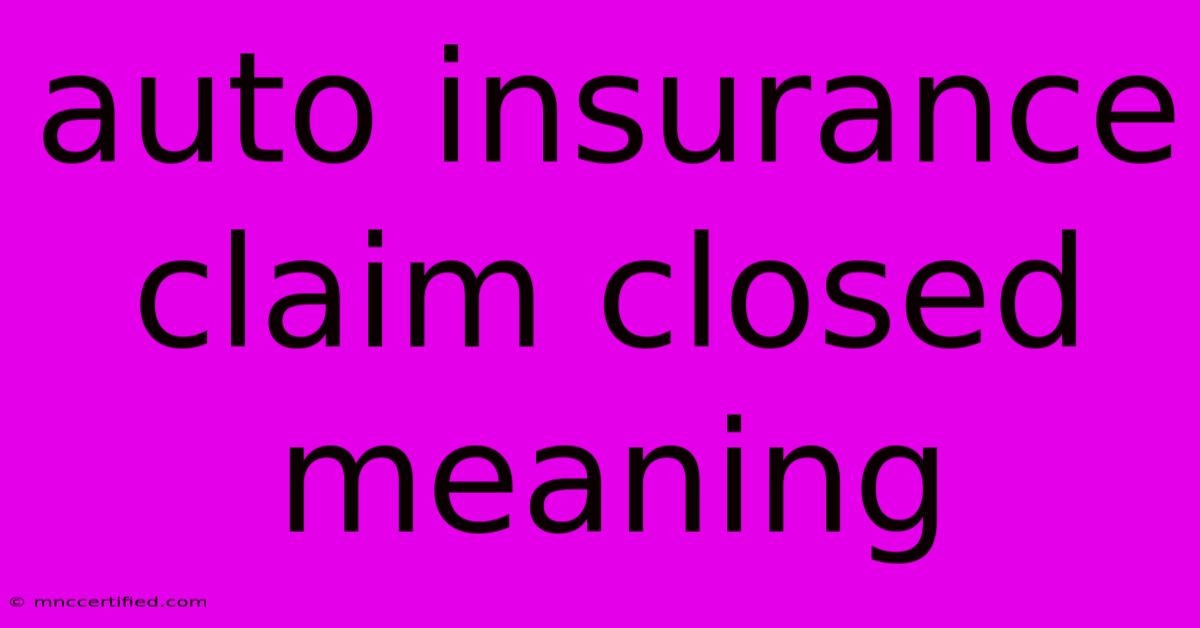Auto Insurance Claim Closed Meaning

Table of Contents
What Does "Closed" Mean for Your Auto Insurance Claim?
So, you've been in an accident and filed a claim with your auto insurance company. You've been through the process of providing details, submitting documents, and maybe even dealing with an adjuster. Now, you see that your claim status has been updated to "closed". What does this mean, and what should you do next?
This article will break down the meaning of a "closed" auto insurance claim, explore the different reasons for closure, and guide you on how to proceed based on your specific situation.
Understanding the Closure Process
When your insurance company closes your claim, it signifies that they have completed their investigation and reached a decision regarding your claim. This decision can be either in your favor, meaning your claim is approved and you will receive payment for your covered losses, or it can be a denial, meaning your claim is rejected and you will not receive compensation.
Here are some key points to remember about a closed claim:
- It's not always the end: Even though the claim is closed, you may still have options. You can appeal the decision if you disagree with it or explore other avenues for compensation.
- Closure doesn't necessarily mean payment: While a closed claim can signify payment, it doesn't guarantee it. Your insurance company may have closed your claim after denying it, or they may have closed it while waiting for further information or action from you.
- Closure doesn't necessarily mean the case is settled: Sometimes, a closed claim can signify that the insurance company is waiting for a final settlement with the other parties involved in the accident.
Reasons for Claim Closure
There are several reasons why your auto insurance claim might be closed. These reasons can fall into one of two categories:
1. Claim Approval:
- Full payment: Your claim has been fully processed, and you have received payment for all covered losses. This means the insurance company has finalized their investigation and agreed to cover your damages and expenses.
- Partial payment: The insurance company has partially approved your claim, covering some of your losses but not others. You may receive payment for certain expenses, like repairs to your vehicle, but not for others, such as lost wages or medical bills.
- Settlement with another party: If you were involved in a multi-party accident, your insurance company may have reached a settlement with another party involved, closing your claim as part of that process.
2. Claim Denial:
- Claim not covered: Your claim may be denied because the damages are not covered under your policy. This could be due to factors like exceeding the coverage limits, exceeding the deductible, or being excluded by your policy.
- Insufficient evidence: The insurance company may have denied your claim because they do not have enough evidence to support your claims. They may require further documentation or witness statements to justify the claim.
- Fraudulent claim: Your claim may be denied if the insurance company suspects fraud or misrepresentation.
What to Do After Your Claim is Closed
The next steps you take depend entirely on the reason for your claim's closure.
If your claim is approved:
- Review your payment: Ensure you have received the correct amount for all covered losses. If you believe there is an error, contact your insurance company immediately.
- Complete any remaining steps: Your insurance company may require you to complete certain actions, like signing a release form or providing additional documentation, before receiving your final payment.
If your claim is denied:
- Review the denial letter: Understand the reason for denial and the specific policy terms that were violated.
- Consider an appeal: If you disagree with the denial, you can appeal the decision. Contact your insurance company and follow their procedures for appealing claims.
- Seek legal counsel: In some cases, it may be necessary to hire an attorney to help you navigate the appeals process or pursue legal action against the insurance company.
If your claim is closed but not settled:
- Keep track of communication: Stay informed about any updates or further actions needed.
- Prepare for final settlement: Be ready to provide any additional documentation or information requested by your insurance company.
Conclusion
A "closed" auto insurance claim doesn't always mean the end of your journey. It's important to understand the reasons behind the closure and take appropriate action. By understanding the process and your rights, you can ensure you receive fair compensation for your losses.

Thank you for visiting our website wich cover about Auto Insurance Claim Closed Meaning. We hope the information provided has been useful to you. Feel free to contact us if you have any questions or need further assistance. See you next time and dont miss to bookmark.
Featured Posts
-
Suresave Travel Insurance Australia
Nov 13, 2024
-
Tour Du Mont Blanc Travel Insurance
Nov 13, 2024
-
Self Sets New Kansas Coaching Win Mark
Nov 13, 2024
-
Live Kentucky Mens Basketball Vs Duke
Nov 13, 2024
-
Turpen Insurance In Plainview Texas
Nov 13, 2024